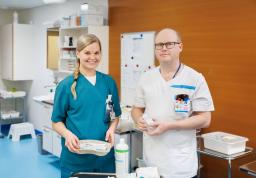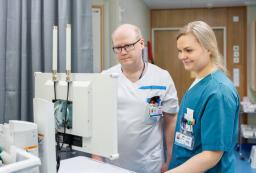Internal substitutes enjoy a varied job
Keywords:Registered nurses Noora Ennis and Mika Räsänen work as internal substitutes at the Inflammation Center’s infectious Diseases Ward K2B and at the Infectious Diseases, Dermatology, and Rheumatology Ward K4B. They both enjoy their work because it is varied, they can influence their shifts and always have the support of experienced colleagues.

Registered nurses Noora Ennis and Mika Räsänen work as internal substitutes at the Inflammation Center. They both enjoy their work because it is varied, they can influence their shifts and always have the support of experienced colleagues.
As internal substitutes, Räsänen and Ennis fill sudden staff shortages wherever at the wards they are needed. They won’t know where they will be working until the day before the shift, but sometimes the location can even change on the morning of if a staff member is off sick.
However, shifts do not come as a complete surprise, but can be planned. Räsänen and Ennis both prefer morning and evening shifts. Weekend or night shifts are not mandatory if an employee does not want to do them.
You always have experienced colleagues and great supervisors there to support you and you never have to cope alone.
“What makes me happy as an internal substitute is that I can influence my shifts and I have the variety that I want. You always have experienced colleagues and great supervisors there to support you and you never have to cope alone,” says Ennis.
Räsänen and Ennis sometimes work at the same ward for a week, sometimes only a single day. They both enjoy the variety of their work, which allows them to develop their skills. The wards are located close to each other in the Meilahti Triangle Hospital, and it is easy to move quickly from one ward to the other if necessary.
Work that suits you
Räsänen was initially convinced to work at HUS by his friend who said that the job offered a satisfying challenge. Räsänen states that specialized healthcare and his role as an internal substitute is exactly what he wants to do.
“HUS is a big and stable employer. I want to work as an internal substitute for as long as I can.”
Räsänen came from the Rheumatology Outpatient Clinic and started a temporary trial period as an internal substitute, which then turned into a permanent position. A long induction period allows you to see what the work entails.
HUS is a big and stable employer. I want to work as an internal substitute for as long as I can.
Both Räsänen and Ennis feel that careful attention has been paid to induction at the wards. Employees who attend a group induction can share their thoughts and experiences during their weeks together. On the other hand, the skill levels of the participants can vary greatly.
“Infectious diseases are my strongest area of expertise, but now I get to learn new skills treating patients with rheumatism and skin diseases,” says Ennis, who has treated patients with COVID-19, for example.

Always welcome at work
Räsänen has had a long career at HUS as a nursing professional and the work at the infectious diseases ward is very familiar, but even he has found new things to learn.
“This is also where patients with the rarest infectious diseases, such as the hemorrhagic fever, Ebola, come to be treated. We need a special kind of expertise here, for example in antibiotic treatment," says Räsänen.
As Räsänen and Ennis work at two wards, they each are part of two work communities. Both have a strong sense of belonging to both groups.
“You always feel appreciated and welcome! You can always ask and receive help and that is really important for your wellbeing,” says Ennis.
Original text: Tiina Tuominen
Images: Mikko Hinkkanen